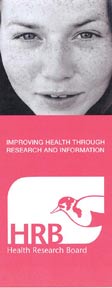| 2005 |

|
YEAR BOOK |
Health Research Board
|
Today's health research is tomorrow's health care
|

The Health Research Board (HRB) is on a journey of discovery. Knowledge gained on this journey will result in the most remarkable transformation in our understanding of the human body and of health and disease that has ever been seen. A vibrant research culture is now emerging within the Irish health service, with more than 100,000 professionals bringing their skills to bear on all aspects of prevention, diagnosis, treatment and care. Scientific research is the backbone of many of the treatments and services which will help to improve health, combat disease, reduce disability and enhance the quality and equity of care for thousands of people every day.
In 2005, the HRB has played a key role in conducting and supporting some really exciting research that will have a real impact in bringing the benefits of research to patients, developing a world-class health service and ensuring that Ireland contributes to international efforts to prevent disease.
Lifestyle choices can impact your health
The year started with a bang at the ESAT BT Young Scientist and Technology Exhibition, where thousands of young visitors to the HRB stand found out how certain lifestyle choices could impact their health. The link between diabetes and obesity, keeping your heart healthy, and the importance of looking after your gut were just some of the stories presented to illustrate how everyday choices can influence our health and how research can inform those choices. It was interesting to see that many of the young scientists had chosen health-related topics for their own research projects � an encouraging sign that health is a focus for many of our future young scientists.
New research fuels debate on folic acid fortification
Spina bifida is one of a group of birth defects, called neural tube defects (NTDs), which are major congenital malformations of the central nervous system. NTDs are relatively common conditions that affect about one in every 1,000 births in Ireland and spina bifida accounts for about half of these conditions.
The HRB, in collaboration with Trinity College Dublin and the National Institutes of Health in the US, has been involved in high-profile research which discovered that a single genetic polymorphism resulted in half of the Irish population being at increased risk of developing NTDs as embryos and that up to 75 per cent of these cases could be prevented if mothers took folic acid before pregnancy. This, and earlier research findings by the group, has helped inform public health policy in Ireland, where folic acid fortification of a staple food, such as flour, is now being considered. This could help to ensure that women of childbearing age get the extra folic acid from food that they may consume regularly. Many other countries, including the United States, Canada, Argentina, and Chile, have already introduced food fortification with folic acid as a way of reducing the incidence of spina bifida.
New links between medical research and patient care
The first Irish clinician scientists were appointed in 2005. Clinician scientist awards were introduced by the HRB to support medical consultants to focus on world-class research in areas that will have direct benefits for patient care. The first two awards, totalling nearly �3 million, will help address real health issues in Ireland.
Dr Mary Cannon, a senior lecturer in psychiatry at the Royal College of Surgeons in Ireland and a consultant at Beaumont Hospital, will investigate the onset of schizophrenia in young adults. The project will monitor the brain development of at-risk young adults through a variety of imaging techniques and psychological assessments, with a view to improving early detection and prevention.
Dr Joe Keane, a consultant in respiratory medicine at St James's Hospital in Dublin, will focus on new ways to prevent and treat tuberculosis, a chronic lung disease which claims the lives of two million people worldwide every year, and the incidence of which has increased in Dublin over the past two years.
Information systems to underpin R&D for health
Good health research depends on good clinical information. The HRB introduced a scheme in 2003 to support the development of research information systems relevant to the health services. Just one of the successful outcomes in 2005 has been the development of an electronic patient record system for the fully integrated clinical care and research programme for epilepsy at Beaumont Hospital. The epilepsy team has used the funding provided by the HRB to introduce electronic information systems and an electronic patient record to integrate all activities.
"Diagnosis and treatment of epilepsy, and indeed any chronic disease, involves integration of a variety of data types from multiple clinical disciplines," explains Mary Fitzsimmons, the principal investigator and head physicist at Beaumont Hospital. "Our ultimate aim is to understand the causes of epilepsy better and improve our care of patients and their carers. This award has helped us start to pull together the large volumes of data from different clinics and laboratories to improve the quality and integrity of recorded patient information, make our services more efficient and have essential information for clinical and health services research," she concluded.
Contact: Gillian Markey; Communications Manager,
Health Research Board - An Bord Taighde Sl�inte,
73 Lower Baggot St, Dublin 2;
Tel: +353 1 676 1176;
Email: [email protected] ; Web: www.hrb.ie